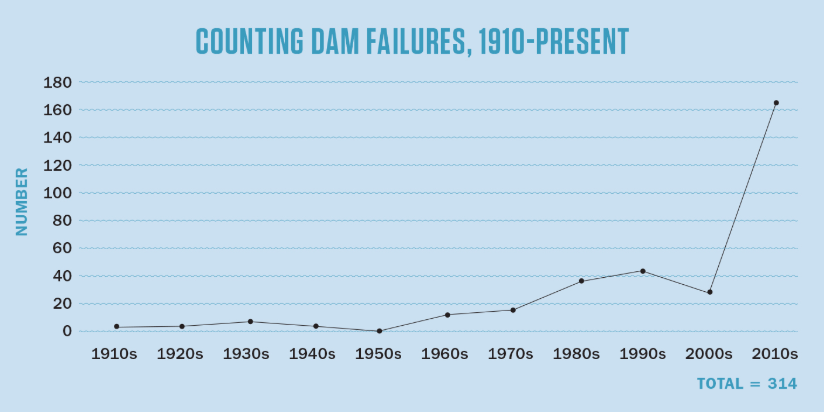When stuff that should work just gets worse and worse, you know your state is failing.

Then we have the overdose rates…(pdf)

People who are happy and have hope for the future rarely become drug addicts.
Adam Smith wrote that “…there is a great deal of ruin in a nation.”
That amount is not infinite.
The US is not keeping up its infrastructure. It is not building important new infrastructure, as anyone who has seen high-speed trains overseas (or good airline terminals) knows.
The US is losing wars. It is losing in Afghanistan. When it left Iraq it had to pay local militias not to attack as it left. It arguably won in Libya, if you call contributing to a refugee crisis destabilizing its main strategic partner, the EU, winning, which anyone sane wouldn’t.
The US has turned, in large part, against the World Trade Organization, which it created. Even before turning against it, the WTO failed in its latest round of trade negotiation.
The prices of basic medicines in the US are soaring (the price of insulin has tripled) and there is an actual decline in life expectancy–the first since the Spanish Flu.
The US is alienating its most important allies, like the EU. Increasingly, it uses financial sanctions to punish nations, which has led to talk of creating a financial network without the US at its center.
Core manufacturing (for example, of computer chips) has moved offshore, and the US is no longer the key manufacturer of electronic goods, nor are any of its allies (Japan controlling this wouldn’t matter much, China doing so, does). The most advanced 5G technology was created by China. The most important technological city in the world is in China.
China now manufactures more than the US, and in purchasing power parity terms, has a larger economy.
Core nations like Italy (a member of the G7) are beginning to look to Beijing. Italy has signed up for China’s Belt and Road Initiative, which is, among other things, a rival to the WTO and the US-led trade order. Non-core nations are increasingly turning to China for loans and development, for which China is willing to lend them the money, often at better rates than the IMF and WTO with less demands for internal controls.
The US military is showing signs of being unable to create effective, advanced military equipment: Take for example, the F-35, which basically can’t fly. It is showing signs of intense incompetence, as when it let multiple planes be destroyed on the ground by a hurricane rather than, uh, fly them out or get them under effective cover.
The US is led by Donald Trump, a reality TV star, who was made to look like an effective billionaire mogul by clever editing. While Trump is not without his competencies (he did spend his life shitting into a gold toilet and screwing models), he’s clearly a few screws loose and a flaming narcissist.
Meanwhile the opposition party, faced with an extremely unpopular president, mutters about “working together” and how they would never impeach a weak President.
The US is a gold-flecked garbage heap slowly rolling towards the ocean. On fire.
There is a lot of ruin in a nation, but for almost 40 years now, US elites have treated the US as something to loot, and assumed that the good times would keep rolling. They were uninterested in actually governing. They were happy to move much of the US’s core manufacturing overseas, to the most likely nation to replace America as a hegemon, because the Chinese were smart enough to make American elites rich.
And so, today, large parts of the US are shitholes, which the residents hate so much they are consuming record amounts of drugs and committing suicide, because who the fuck wants to live in a nation with no hope, shitty bosses, and no hope.
Oh, of course, there are people doing well. There were people doing well in 400AD as the Roman Empire collapsed. There are always some people doing well.
But the number of people doing well keeps getting less and less, and the decline keeps getting worse and worse.
But the top is doing fine, so they see no reason to do anything.
Heck, Trump just gave them another tax cut. Everyone they know is doing great.
And so the decline goes on, because until the elites are made to feel the pain of the majority, they will not change.
And so far, no one is willing or able to make the elites pay.
The results of the work I do, like this article, are free, but food isn’t, so if you value my work, please DONATE or SUBSCRIBE.
 It’s worth remembering that before Hillary Clinton convinced Barack Obama to support bombing the hell out of Libya, Libya had the highest standard of living in Africa.
It’s worth remembering that before Hillary Clinton convinced Barack Obama to support bombing the hell out of Libya, Libya had the highest standard of living in Africa.


 There’s a lot of nonsense around this question. I’ve written about
There’s a lot of nonsense around this question. I’ve written about 
 The problem with ridesharing is simple.
The problem with ridesharing is simple.